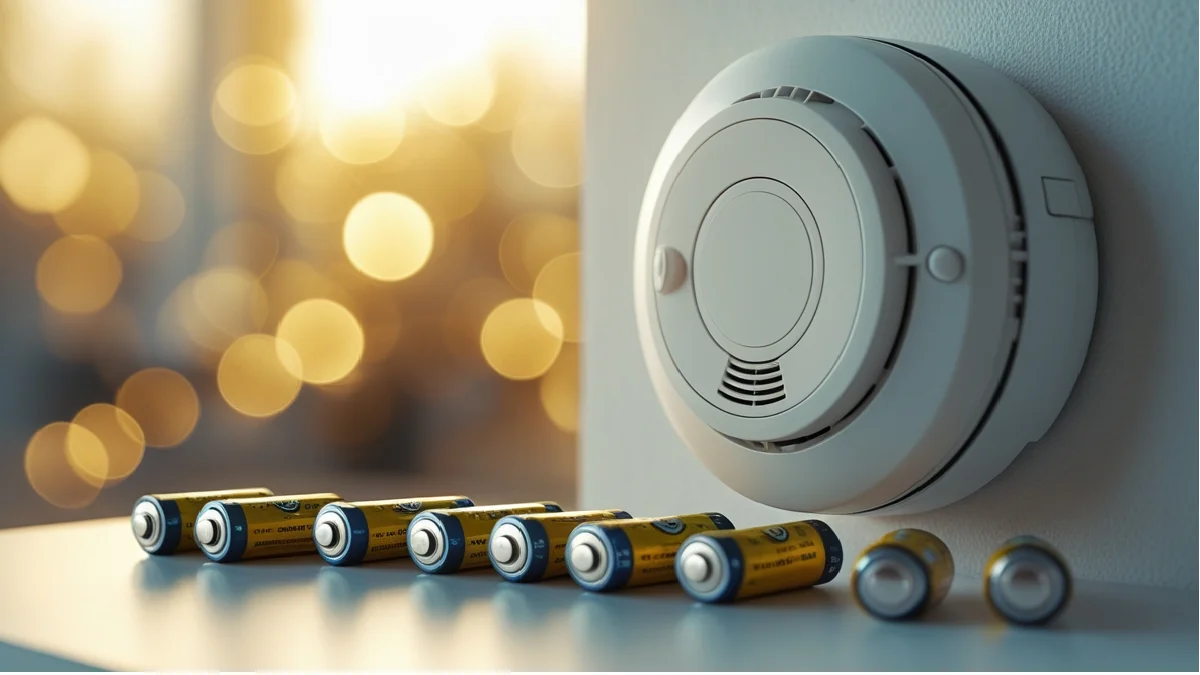Batteries for Smoke Detector
- When a fire starts, seconds matter. That’s why reliable batteries are essential for smoke detectors—your alarm can’t warn you if the power’s not there.

- If you’re shopping for batteries for smoke detector units, choosing the right one helps ensure early detection and keeps your family safe around the clock.
Why Choosing the Right Battery Matters
- It’s a safety component, not an accessory: Your battery is the heartbeat of your smoke alarm. A weak or dead battery turns a life-saving device into a plastic disc on the ceiling.
- Regular vs. long-lasting: Standard alkaline batteries are affordable but don’t last as long. Lithium batteries cost more upfront but deliver much longer life and better performance in extreme temperatures.
- Power outages: For hardwired smoke alarms, the battery is your backup when the lights go out. A dependable battery keeps protection running during storms, wildfires, or grid failures.
Types of Batteries for Smoke Detectors
- Alkaline (most common, usually 9V or AA)
- Pros: Affordable, easy to find anywhere.
- Cons: Shorter lifespan; voltage drops faster near end-of-life.
- Best for: Budget-friendly replacement in basic detectors.
- Lithium (primary, non-rechargeable)
- Pros: Long-lasting (often several years), great shelf life, works well in heat/cold.
- Cons: Higher upfront cost.
- Best for: Hard-to-reach detectors, busy households, and hardwired alarms (as backup).
- Rechargeable (NiMH/Li-ion)
- Pros: Eco-friendly, reusable, less waste.
- Cons: Not always recommended for smoke alarms—lower nominal voltage (for AA), self-discharge, and potential for false “low battery” chirps. Many 9V rechargeables are 8.4V or 9.6V equivalents, which can confuse some alarms.
- Best for: Only if your detector’s manual explicitly allows rechargeables.
Tips to choose:
- Always match what your detector’s manual specifies (battery chemistry and size).
- If your home sees big temperature swings (attic, garage), go lithium.
- If you have a hardwired alarm, prioritize a high-reliability battery for the backup.
- If your detector has a sealed 10-year battery, you don’t replace the battery—you replace the entire unit at end-of-life.
How Long Do Smoke Detector Batteries Last?
- Alkaline (9V or AA): About 6–12 months in most alarms. Some may stretch longer, but plan yearly replacement for safety.
- Lithium (9V or AA): Often 3–5+ years in compatible detectors. Note: the 10-year life you hear about usually refers to sealed alarms with integrated lithium cells, not a standard replaceable 9V.
- Rechargeable: Highly variable; often not recommended unless the manufacturer says it’s okay.
Signs it’s time to replace:
- Chirping/beeping every 30–60 seconds
- Flashing “low battery” light
- More frequent nuisance chirps in colder months
Safety recommendation: Replace batteries every 6–12 months unless your detector and battery combo is rated for longer—and still test monthly.
Best Batteries for Smoke Detectors in 2025
Note: Always verify compatibility with your detector’s manual.
- Energizer 9V Lithium (L522)
- Type: Primary lithium 9V
- Pros: Long life, great cold/heat performance, very low self-discharge
- Typical lifespan in detectors: 3–5+ years
- Price range (per battery): About $8–15
- User ratings/feedback: Consistently high; praised for reliability in smoke alarms
- Best for: Hard-to-reach alarms, hardwired backups, long intervals between changes
- Duracell CopperTop 9V (MN1604)
- Type: Alkaline 9V
- Pros: Easy to find, trusted brand, solid performance
- Typical lifespan in detectors: 6–12 months
- Price range (per battery): About $2–4 (lower in multipacks)
- User ratings/feedback: Widely reviewed; dependable everyday option
- Best for: Routine annual replacement
- Panasonic 9V Alkaline
- Type: Alkaline 9V
- Pros: Good value, stable performance, widely available
- Typical lifespan in detectors: 6–12 months
- Price range (per battery): About $2–3
- User ratings/feedback: Positive value-for-money reviews
- Best for: Cost-conscious households replacing multiple alarms
- Amazon Basics 9V Alkaline
- Type: Alkaline 9V
- Pros: Budget-friendly, convenient multipacks
- Typical lifespan in detectors: 6–12 months
- Price range (per battery): About $1.50–3 (in bulk)
- User ratings/feedback: Generally solid for the price; performance can vary by batch
- Best for: Stocking up and keeping spares at home
Helpful note:
- Some modern detectors use AA batteries, not 9V. If yours does, look for Energizer Ultimate Lithium AA for maximum longevity. For 9V specifically, lithium like Energizer L522 is the long-life pick.
How to Replace a Smoke Detector Battery (Step-by-Step)
Before you start:
- If the alarm is hardwired, turn off power at the breaker for safety.
- Use the battery type listed in your alarm’s manual.
Steps:
- Remove the alarm from its base. Twist counterclockwise or release the latch.
- Open the battery door. Some models have a side hatch; others open from the back.
- Take out the old battery. Note the polarity (+ and -).
- Install the new battery. Match the terminals correctly and seat it firmly.
- Close the battery door. Many alarms won’t mount unless the door is fully shut.
- Reattach the alarm to the base. Twist clockwise until it clicks.
- Restore power (for hardwired models).
- Test the alarm. Press and hold the test button until it sounds.
Tip: If you prefer a visual demo, search “replace 9V smoke alarm battery” on YouTube—most videos are under 2 minutes and show exactly what to expect.
Common Mistakes to Avoid Batteries for Smoke Detector
- Using expired or near-expiry batteries
- Mixing brands or chemistries in the same device
- Ignoring the manual’s battery spec (alkaline vs lithium)
- Forgetting to test the alarm after replacement
- Removing a battery to stop a chirp and then forgetting to reinstall it
- Trying to replace the battery in a sealed 10-year alarm (replace the unit instead)
Maintenance Tips for Better Performance
- Test monthly by holding the test button until the alarm sounds.
- Vacuum or gently dust the alarm’s vents every 3–6 months.
- Replace the entire smoke detector every 10 years (check the manufacture date on the back).
- Keep a small stash of spare batteries at home.
- If false alarms are common, relocate according to the manual (avoid steamy kitchens or bathrooms).
FAQs About Batteries for Smoke Detectors
- What is the best battery for a smoke detector?
- For 9V models, a primary lithium like Energizer 9V Lithium (L522) is the long-life choice. For AA-based alarms, Energizer Ultimate Lithium AA is excellent. Always follow your manual.
- Can I use rechargeable batteries?
- Only if the manufacturer says it’s okay. Many alarms don’t play well with rechargeables due to voltage and self-discharge differences.
- How often should I change the battery?
- Test monthly. Replace at least every 6–12 months for alkaline, and every 3–5+ years for compatible lithium—sooner if you hear chirps.
- Are lithium batteries completely safe?
- Yes when used as intended and not damaged. Don’t short, crush, or expose to extreme heat. Dispose or recycle according to local guidelines.
- Battery Smoke Detectors: Discover 2025’s best 9V and lithium options, how long they last, and a quick step-by-step replacement guide facebook.
Conclusion : Batteries for Smoke Detector
The right batteries for smoke detectors aren’t just a convenience—they’re a lifeline. Choose a trusted brand, match your detector’s specs, and test monthly. Whether you go with a long-lasting lithium 9V or a dependable alkaline replaced every year, a small investment today can make a life-saving difference.


Leave a Reply to What Is a Smoke Shpp Guide to Modern Tobacco & Vape Shops Cancel reply